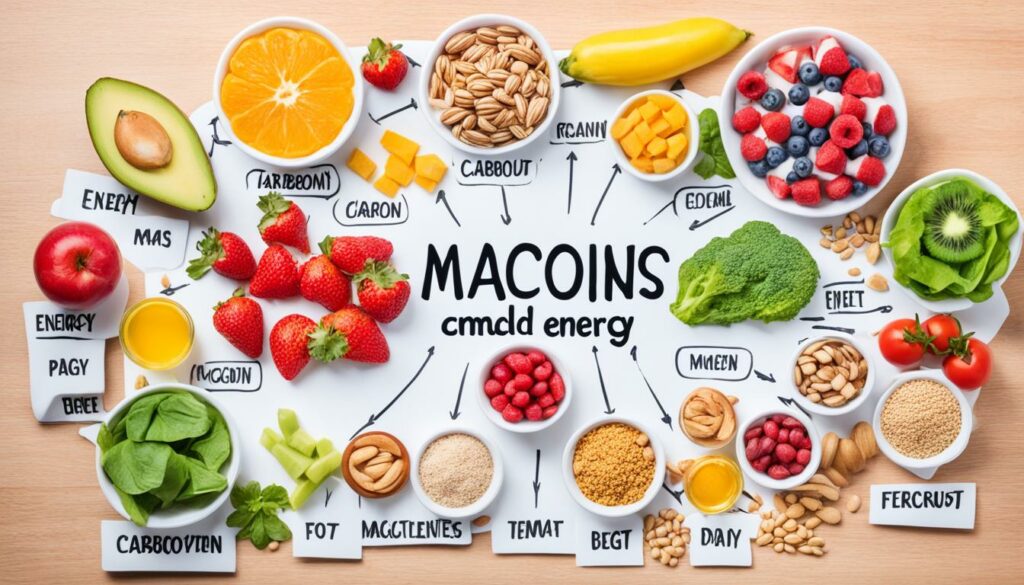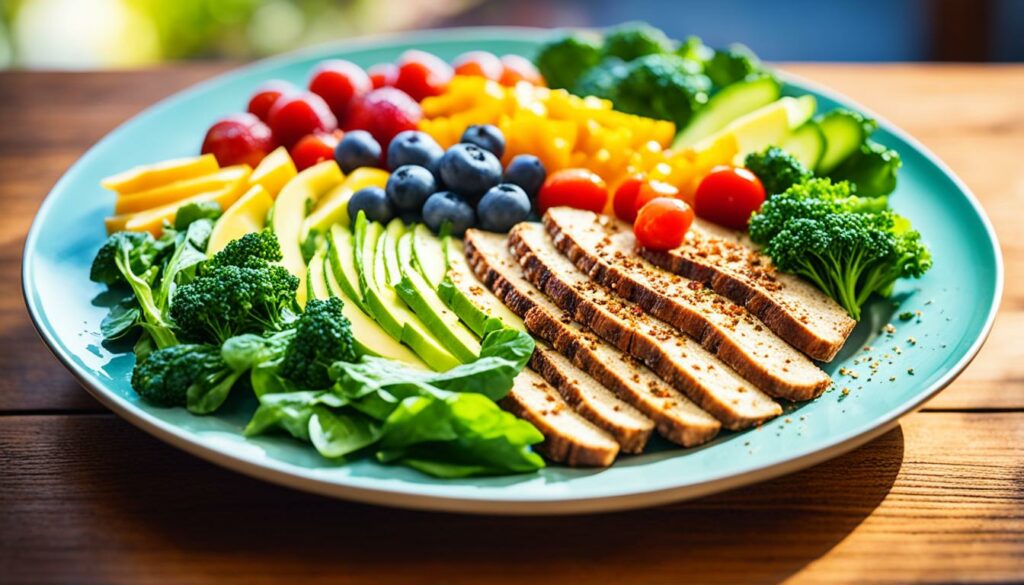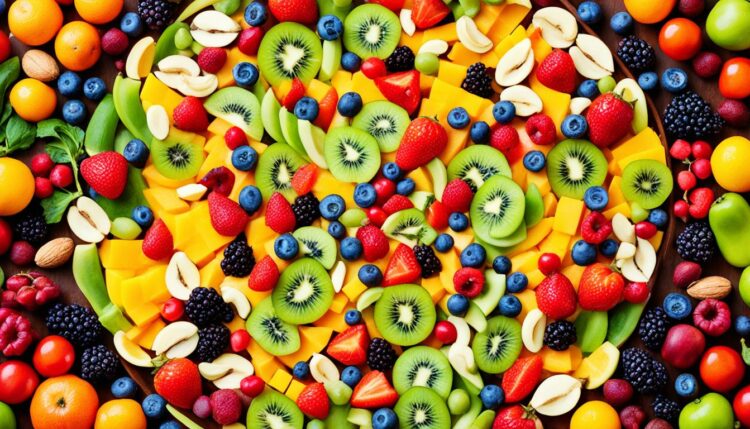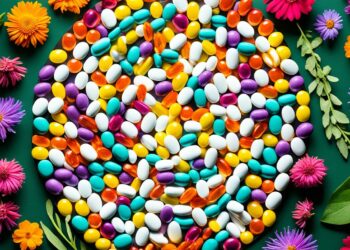Did you know that nearly 70% of adults don’t get enough vitamins and minerals daily? This fact shows how key your diet is for feeling full of energy. Eating right affects how energetic you feel all day. By eating foods full of nutrients, you help your body and fight off tiredness that can slow you down.
Healthy eating habits and recipes that boost energy can really improve your health. Sometimes, even with whole foods, you might need supplements to get the extra boost. Food is the main source of energy for your body. So, choosing foods that give you lots of energy is crucial.
Whether you want to work out or stay sharp all day, the right food is key. It helps you stay full of life and keeps your energy up.
Want to know how exercise can boost your sexual stamina? Check out this helpful guide on exercise routines for enhancing sexual stamina.
Key Takeaways
- Proper nutrition is essential for maintaining high energy levels and preventing fatigue.
- Balanced meals, incorporating proteins, carbohydrates, and healthy fats, optimize vitality.
- Hydration plays a critical role in supporting energy and overall health.
- Energy-boosting recipes can enhance your daily nutrient intake effectively.
- Dietary supplements may be necessary for those unable to meet their nutrient needs through food alone.
Understanding the Role of Nutrition in Energy Levels
Nutrition is key to your energy levels all day. Eating the right foods can boost your energy and keep it up. A balanced diet changes how you feel and do things every day.
Macronutrients as Energy Sources
Carbs, protein, and fats are the main foods that give you energy. Carbs turn into sugars that your body uses easily. Healthy fats, like in avocados and nuts, give you energy for a longer time. They slow down sugar absorption, avoiding energy drops after eating sugary foods.
Protein helps your muscles work and recover. Foods high in protein, like eggs, beans, and fish, give you energy and fight fatigue. An unpublished study from ZOE found that 82% of people felt more energetic after three months on a personalized diet. This shows how important the right balance of nutrients is for your energy.
The Importance of Food Quality
What you eat matters as much as how much you eat. Choosing whole, nutrient-rich foods boosts your energy more than eating processed foods with added sugars and unhealthy fats. Foods high in fiber, like green peas, broccoli, and avocados, help with digestion and keep your energy steady.
Snacks with carbs, proteins, or healthy fats can give you a quick energy boost. Some good examples are:
- Carrots and hummus
- Apples and peanut butter
- Avocado on whole grain bread
- Yogurt topped with fruit
Good eating habits can stop you from feeling tired from eating too much processed food. Cutting down on sugary snacks and drinks can help you manage your energy better. Making these changes can keep your energy steady all day.

| Macronutrient | Source Examples | Benefits |
|---|---|---|
| Carbohydrates | Whole grains, fruits, vegetables | Quick energy source, supports brain function |
| Healthy Fats | Avocados, nuts, olive oil | Provides sustained energy, reduces energy crashes |
| Protein | Beans, dairy, fish | Supports muscle recovery, prevents fatigue |
By focusing on the right nutrients and quality foods, you can increase your energy and feel better overall.
Nutrient-Dense Foods for Sustained Energy
Eating foods full of nutrients is key to keeping your energy up all day. These foods fuel your body and give you important vitamins and minerals. Eating whole grains and complex carbs, plus lots of fruits and vegetables, boosts your energy and health.
Incorporating Whole Grains and Complex Carbs
Whole grains and complex carbs are great for your energy. Foods like oats, quinoa, and sweet potatoes have lots of fiber. This fiber helps release energy slowly.
A half-cup of oats gives you 16% of the daily magnesium you need. This helps make energy and work muscles. Sweet potatoes give you 20 grams of carbs and are full of vitamins C, iron, and magnesium. These help keep your energy up and support your health.
Benefits of Fruits and Vegetables
Fruits and vegetables are great for boosting energy. They’re full of vitamins, minerals, and antioxidants that help your body work right. Berries like blueberries and strawberries have lots of vitamin C and antioxidants to fight stress and support brain health.
Bananas give you natural sugars, vitamin B6, and fiber. These help keep your blood sugar stable. Eating a mix of colorful fruits and vegetables gives you many nutrients and boosts your energy. They’re a great choice for anyone looking to eat better.

To boost your energy, eating these nutrient-rich foods is a must. Eating whole grains and lots of fruits and vegetables can make you feel more alive and keep your energy up all day. If you’re thinking about changing your diet, talk to a health expert first. They can help you make the best choices for your health. Learn more about eating well by checking out this guide on clean eating.
Nutrition and Diet for Enhanced Vitality and Energy
Eating the right foods boosts your energy and helps you recover. Lean proteins and healthy fats are key. Knowing where to find these nutrients helps you make better food choices.
Lean Proteins: Vital for Energy and Recovery
Lean proteins like chicken, turkey, and fish are great for fixing muscles and boosting energy. Adding these to your meals keeps your energy steady, stopping the tired feeling from low blood sugar. Plant-based options like beans are also good, offering protein without the bad fats in some meats.
Adding foods high in vitamin B12, like clams and dairy, helps your energy too. Eating these proteins every 3 to 4 hours fights tiredness and keeps you feeling good.
Healthy Fats for Optimal Functioning
Healthy fats from avocados, nuts, and fatty fish keep your energy up and your body working right. These fats help you absorb nutrients and keep your brain sharp. Nuts and seeds give you healthy fats and important vitamins and minerals to fight fatigue.
It’s important to eat fewer bad fats from processed foods and more good fats. This balance keeps your energy steady and helps you stay enthusiastic and productive all day.
Mindful Eating Practices
Adding mindful eating to your daily life can boost your energy. It makes you pay attention to what and how much you eat. This way, you connect more with your meals and help manage your food intake better.
The Power of Portion Control
Managing your food portions is key to keeping your energy up. Mindful eating helps you know when you’re full, leading to smaller, balanced meals. This stops you from eating too much and feeling tired later. By controlling your portions, you can:
- Feel satisfied sooner, eat less, and avoid overeating.
- Choose healthier foods by knowing how they affect your energy.
- Improve digestion by eating slowly and focusing on your food.
Hydration’s Impact on Energy
Drinking enough water is vital for your body’s function and energy. Not drinking enough can make you tired and less focused. Here are ways to stay hydrated:
- Always carry a water bottle to remember to drink.
- Add fruits or herbs to your water for a tasty twist.
- Use a journal or app to track your water intake and meet your goals.
Studies show that eating mindfully, paying attention to food’s texture, taste, and your body’s signals, leads to healthier eating. It might not always help you lose weight, but it improves your relationship with food. This can greatly help you manage your energy levels.
| Mindful Eating Benefits | Details |
|---|---|
| Improved Awareness | Helps you notice when you’re hungry or full, leading to better portion control. |
| Healthier Choices | Makes you think about how food affects your mood and energy, helping you choose better. |
| Better Digestion | Eating slowly and with focus improves digestion and nutrient absorption. |
| Reduced Overeating | Mindfulness lowers the risk of eating out of boredom or stress. |
Conclusion
Creating a balanced diet plan is key for keeping your energy stable and your health strong. Modern diets often have too much energy, leading to health issues like obesity and heart disease. Eating nutrient-rich foods, like those in the Mediterranean diet, helps your body fight these problems.
Want to boost your nutrition? Check out recipes that give you energy and stick to healthy eating habits. These choices not only make you feel more energetic every day but also help you stay healthy for the long run. Adding fruits, veggies, whole grains, and lean proteins to your meals can make a big difference in your health.
It’s all about making healthy choices part of your everyday life. With regular effort and smart choices, you can manage your energy better and live a healthier life. For more tips on how nutrition affects your sexual health, look into anti-inflammatory foods that are good for you.
FAQ
What are the main sources of energy in our diet?
Carbohydrates, proteins, and fats are the main energy sources in our diet. Carbs give us quick energy. Fats help us stay energized for a long time. Proteins are important for muscle recovery and keeping us from getting tired.
How do I incorporate nutrient-dense foods into my meals?
To add nutrient-dense foods to your meals, eat whole grains like oatmeal and quinoa. Also, include a variety of colorful fruits and vegetables. These foods are full of vitamins and minerals that keep your energy up.
What are some energy-boosting recipes I can try?
Try recipes with whole grains, lean proteins, and healthy fats for a boost. For example, a quinoa salad with avocados and mixed vegetables or a smoothie with spinach, banana, and almond milk are great choices. They’re both tasty and full of nutrients.
How important is hydration for maintaining energy levels?
Drinking enough water is key for your body to work right. It helps keep your energy up. Try to drink water regularly throughout the day to stay hydrated.
What role does mindful eating play in energy management?
Mindful eating means paying attention to what you eat and how much. It helps you avoid eating too much and keeps your energy steady. Eating smaller, balanced meals can also help you stay alert and focused.
Are there specific dietary supplements that can enhance my energy?
Yes, supplements like B vitamins, iron, and omega-3 fatty acids can help with energy. They’re good when you’re not getting enough from food. But, talk to a doctor before starting any new supplements.
How can I effectively manage my weight while improving my energy?
To manage your weight and boost your energy, eat healthy and exercise regularly. Focus on foods that are full of nutrients. Being active helps you burn more calories and keeps your weight in check.




